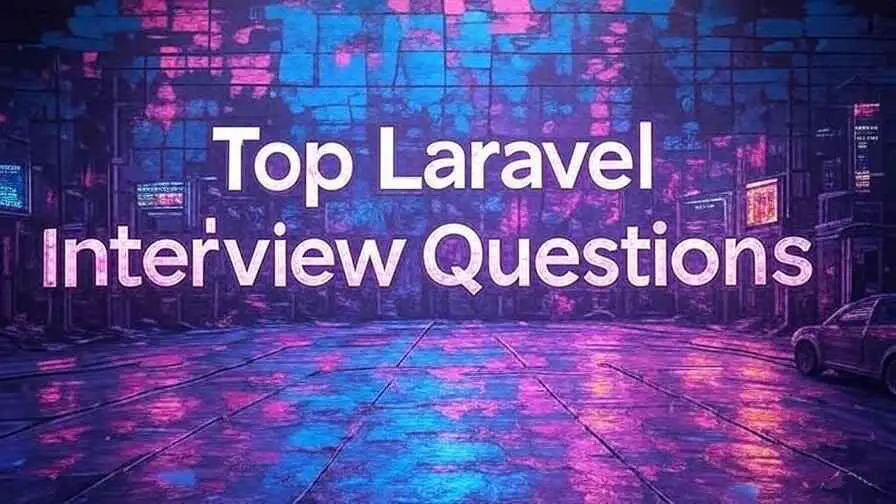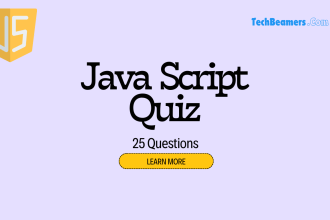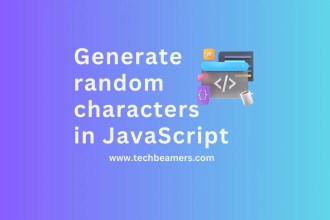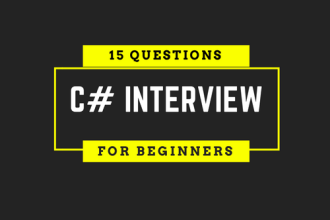Laravel is a top PHP tool for web apps in 2025. It runs sites like Airbnb and 9GAG with neat code and quick builds. Laravel 11 and the next Laravel 12 add new stuff like faster work, safe settings, and cloud help. This means more jobs for Laravel coders. Companies want experts who fix real problems, like fast logins, safe payments, or big data joins.
- Laravel Interview Questions Set #1: Beginner Laravel Questions
- Q1: What is Laravel and why use it?
- Q2: What does MVC mean in Laravel?
- Q3: How do Routes help in Laravel?
- Q4: What is Eloquent ORM in Laravel?
- Q5: What are Migrations in Laravel?
- Q6: What are Blade Templates in Laravel?
- Q7: What is Artisan in Laravel?
- Q8: How does Authentication work in Laravel?
- Q9: What do Controllers do in Laravel?
- Q10: What are Models in Laravel?
- Laravel Interview Questions Set #2: Middle-Level Laravel Questions
- Q11: What are Eloquent Relationships in Laravel?
- Q12: How does Middleware work in Laravel?
- Q13: What is Validation in Laravel?
- Q14: What are Queues in Laravel?
- Q15: How does Caching work in Laravel?
- Q16: What are Events and Listeners in Laravel?
- Q17: What are Factories and Seeders in Laravel?
- Q18: How does Pagination work in Laravel?
- Q19: What is Localization in Laravel?
- Q20: What are Service Providers in Laravel?
- Laravel Interview Questions Set #3: Experienced Laravel Questions
- Q21: What are Advanced Eloquent Features like Scopes and Accessors?
- Q22: How does API Authentication with Sanctum work?
- Q23: What is Broadcasting in Laravel?
- Q24: What is Horizon for Queues in Laravel?
- Q25: How does Laravel Scout help with Search?
- Q26: What are Policies and Gates in Laravel Authorization?
- Q27: How does Laravel Testing with PHPUnit work?
- Q28: How to make Laravel Performance better?
- Q29: What is Laravel Vapor for Serverless?
- Q30: What is Laravel Nova for Admin Panels?
- More Resources for Web Development Interviews
We looked at top sites like Laravel News, Laracasts, and Stack Overflow’s 2025 reports to update this guide. It has 30 questions for all skill levels. We focus on Laravel 11+ news, easy steps, and ideas. Each has clear info and tips for interviews and jobs—to help you make apps fast, find issues, and stand out.
We split into three parts: 10 for beginners, 10 for middle-level, and 10 for experienced. Try these to handle real tasks, like basic blogs or big online shops.
Laravel Interview Questions Set #1: Beginner Laravel Questions
These cover basics like setup, paths, and views—must-knows for new Laravel users.
Q1: What is Laravel and why use it?
Laravel is a free PHP tool to build web apps. It gives ready parts like user logins and data links to save time and effort. Use it for quick projects because it makes neat code and keeps apps safe, which is easier than using plain PHP alone.
Why it matters: Interviews ask this first to see if you know the basics. At work, it helps you start projects fast and test ideas quickly.
Q2: What does MVC mean in Laravel?
MVC splits code into three parts: Model for handling data, View for showing screens, and Controller for managing actions. It keeps things tidy and simple to change, so you don’t get confused with mixed-up code.
Why it matters: Helps teams work together without mess. Interviews might ask you to explain each part or draw a simple picture of how they connect.
Q3: How do Routes help in Laravel?
Routes connect web links to code actions, like showing a page or saving info. They act like a map for your app, using files like web.php to guide users where they need to go.
Why it matters: Controls how users move around your app. At work, you can add safety checks to routes; interviews ask about different path types like named or simple ones.
Q4: What is Eloquent ORM in Laravel?
Eloquent links PHP code to database tables as models. It makes data tasks easy, like finding or saving info, by letting you work with data without writing hard database commands.
Why it matters: Saves time on data jobs. In real life, it helps with quick searches; interviews check if you understand safe field rules.
Q5: What are Migrations in Laravel?
Migrations are like step-by-step plans to change your database, such as adding tables. You run them with a command tool to keep changes safe, trackable, and easy to undo if needed.
Why it matters: Makes database updates simple and safe. At work, you can roll back changes for tests; interviews ask about automatic time marks.
Q6: What are Blade Templates in Laravel?
Blade is a simple tool to create app screens. It uses easy signs like @ for loops or ifs, and {{ }} for safe text, so you can build pages fast without much trouble.
Why it matters: Speeds up making pages. In real life, you can reuse parts of pages; interviews ask about safe text versus raw text.
Q7: What is Artisan in Laravel?
Artisan is a command tool that helps with tasks like making models or running tests. It’s like a handy helper to set up and fix things in your Laravel app quickly.
Why it matters: Makes starting and managing your app easy. At work, you can create your own commands; interviews ask you to name common ones.
Q8: How does Authentication work in Laravel?
Authentication sets up user logins with safety checks and guards. Laravel gives ready tools like Breeze to start fast, ensuring users can log in securely without extra work.
Why it matters: Keeps user access safe. In real life, it works for apps; interviews compare using cookies or tokens.
Q9: What do Controllers do in Laravel?
Controllers handle requests and show screens or data. They keep actions separate from paths, so your code stays organized and easy to follow.
Why it matters: Keeps work neat. At work, you can use full controllers; interviews ask about adding outside parts.
Q10: What are Models in Laravel?
Models connect to database tables and set rules, like what can be filled. They help manage data jobs in a safe and simple way for your app.
Why it matters: Protects data from mistakes. In real life, you can add extra fields; interviews ask about soft removes.
Laravel Interview Questions Set #2: Middle-Level Laravel Questions
These cover joins, checks, and jobs—key for daily Laravel work.
Q11: What are Eloquent Relationships in Laravel?
Eloquent Relationships link models, like one-to-many or many-to-many, using easy methods to join data without extra steps or confusion.
Why it matters: Makes data links simple. At work, loading early stops slow downs; interviews ask about join tables.
Q12: How does Middleware work in Laravel?
Middleware checks requests before or after actions, like logins or logs, acting as a filter to keep your app safe and smooth.
Why it matters: Adds safety and order. In real life, it limits speed; interviews compare all checks versus path checks.
Q13: What is Validation in Laravel?
Validation checks inputs before saving, using rules like required or email to stop bad data and keep your app clean.
Why it matters: Prevents errors and bad info. At work, you can make your own rules; interviews ask about error notes.
Q14: What are Queues in Laravel?
Queues run jobs later, like sending emails, to keep your app fast by handling big tasks in the background without delay.
Why it matters: Manages heavy work well. In real life, a watch tool helps; interviews ask about failed jobs.
Q15: How does Caching work in Laravel?
Caching stores data temp to speed up your app, like saving views or searches, so you don’t wait long for results.
Why it matters: Cuts down slow parts. At work, use a Redis setup; interviews ask about keep or forget options.
Q16: What are Events and Listeners in Laravel?
Events send notes when something happens, and listeners act on them, like sending emails, keeping your code loose and flexible.
Why it matters: Links code easily. In real life, it does live updates; interviews compare tasks versus events.
Q17: What are Factories and Seeders in Laravel?
Factories make fake data, and seeders fill your database with it for tests, making setup quick and ready to use.
Why it matters: Gives test data fast. At work, add states; interviews ask about reset options.
Q18: How does Pagination work in Laravel?
Pagination splits big lists into pages, making it easy to show data in small, manageable chunks for users.
Why it matters: Handles big data well. In real life, use light pages; interviews ask about adding filters.
Q19: What is Localization in Laravel?
Localization changes text for different languages using lang files, so your app works for people all over the world.
Why it matters: Fits global users. At work, use JSON files; interviews ask about more or less words.
Q20: What are Service Providers in Laravel?
Service Providers start app parts like paths or links, setting everything up when your app begins to run smoothly.
Why it matters: Gets app ready fast. In real life, delays starts; interviews ask about start versus add steps.
Laravel Interview Questions Set #3: Experienced Laravel Questions
These cover tough data, safety, tests, and big apps—for senior roles.
Q21: What are Advanced Eloquent Features like Scopes and Accessors?
Scopes add quick query helpers, and accessors change data when you get it, making searches and displays smarter and easier to use.
Why it matters: Keeps queries neat and smart. At work, use all scopes; interviews ask about changing back.
Q22: How does API Authentication with Sanctum work?
Sanctum gives tokens for apps or phones, making safe logins easier and better than other tools like Passport.
Why it matters: Secures APIs well. In real life, use own tokens; interviews compare to Passport.
Q23: What is Broadcasting in Laravel?
Broadcasting sends live updates to users via WebSockets, like chats, using tools like Pusher or Redis for real-time action.
Why it matters: Runs live apps smoothly. At work, use user channels; interviews compare tasks versus events.
Q24: What is Horizon for Queues in Laravel?
Horizon watches queues with a dashboard, stats, and restarts, helping you manage big jobs without stress.
Why it matters: Controls heavy work easy. In real life, a watch tool helps; interviews ask about stats.
Q25: How does Laravel Scout help with Search?
Scout adds full-text search using tools like Algolia, making it simple to find data fast in your app.
Why it matters: Speeds up finding things. At work, build an index; interviews ask about search tools.
Q26: What are Policies and Gates in Laravel Authorization?
Policies check user actions on data, and gates set simple rules, giving you fine control over who can do what.
Why it matters: Manages permissions well. In real life, gates do quick checks; interviews ask about add-ons.
Q27: How does Laravel Testing with PHPUnit work?
Laravel uses PHPUnit to test code, with helpers to check data, making sure everything works right before going live.
Why it matters: Confirms code quality. At work, run full tests; interviews ask about fake parts.
Q28: How to make Laravel Performance better?
Use caching, early loads, query logs, and Horizon to make your app run fast and smooth for users.
Why it matters: Keeps apps quick and happy. In real life, use Octane run; interviews ask about too-many problem.
Q29: What is Laravel Vapor for Serverless?
Vapor runs Laravel on AWS Lambda, grows auto, and needs no servers, saving money for big traffic days.
Why it matters: Handles big loads cheap. At work, use auto builds; interviews compare to setup.
Q30: What is Laravel Nova for Admin Panels?
Nova builds admin dashboards with data and tools, making it easy to manage your app’s back end without extra coding.
Why it matters: Creates admin fast. In real life, add own tools; interviews ask about data parts.
More Resources for Web Development Interviews
- Start Learning with 30 PHP Interview Questions for Freshers
- Prepare with 20 PHP Interview Questions for Experienced
- Check Top Web Developer Interview Questions for more prep.
- Explore Top 30 Node.js Interview Questions for full-stack skills.
- Check Laravel.com for 11 docs.
Save this for fast review—share on LinkedIn/Twitter if it helped!
These 30 questions ready you for 2025 Laravel interviews. They mix easy starts with tough like Eloquent joins and serverless. Learn the ideas to fix real issues like safe logins or fast searches. With Laravel growth, these skills lift your job in web roles.
Happy coding, TechBeamers Team





